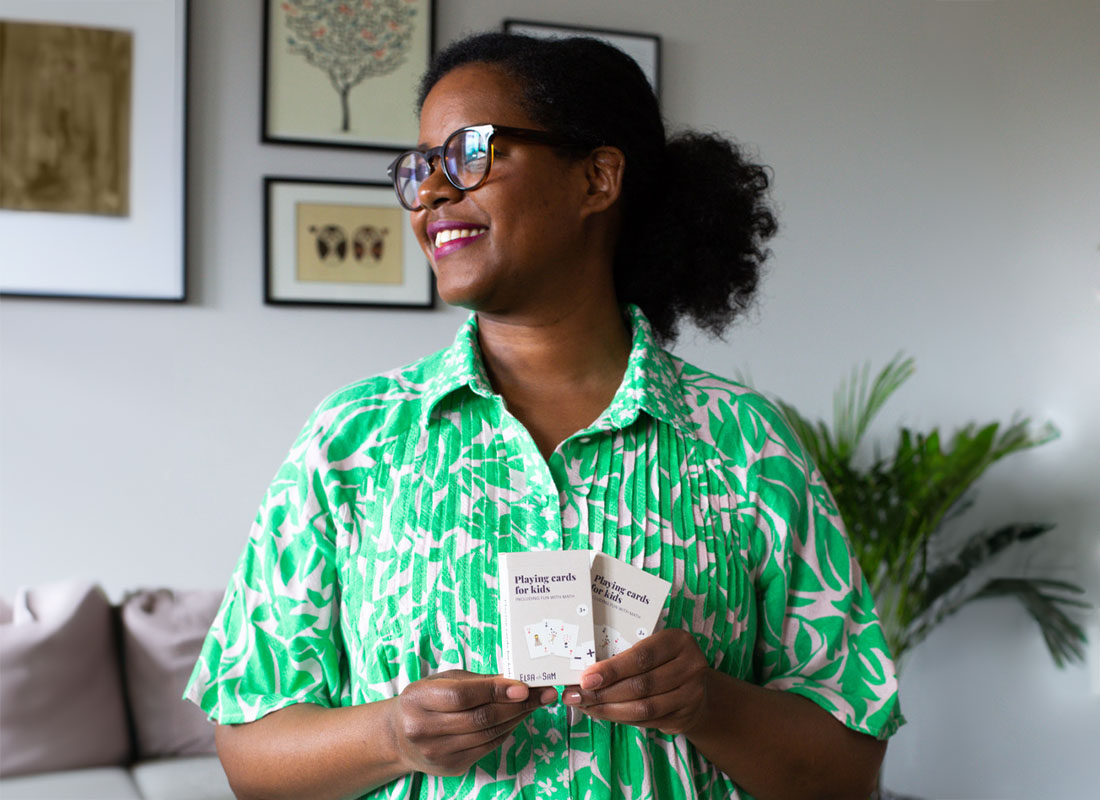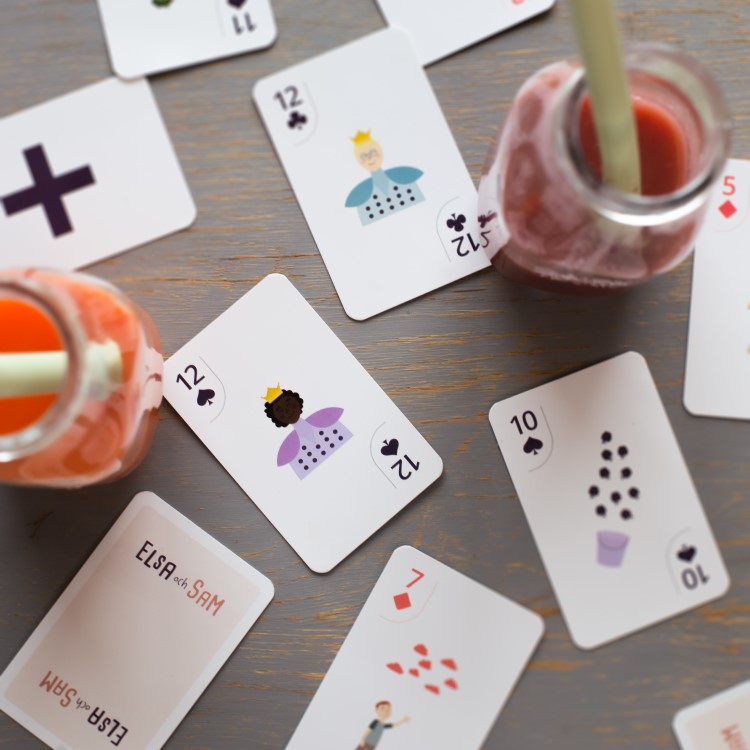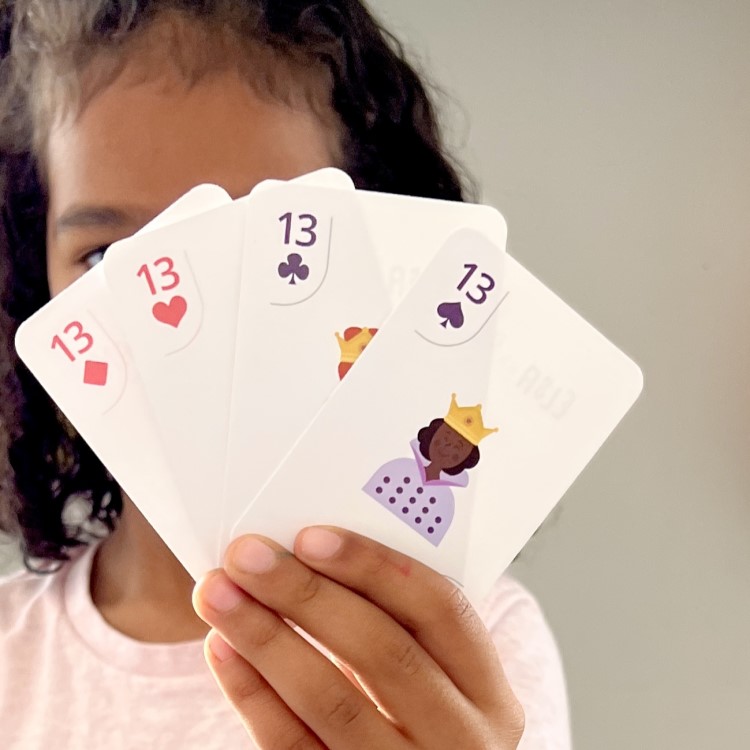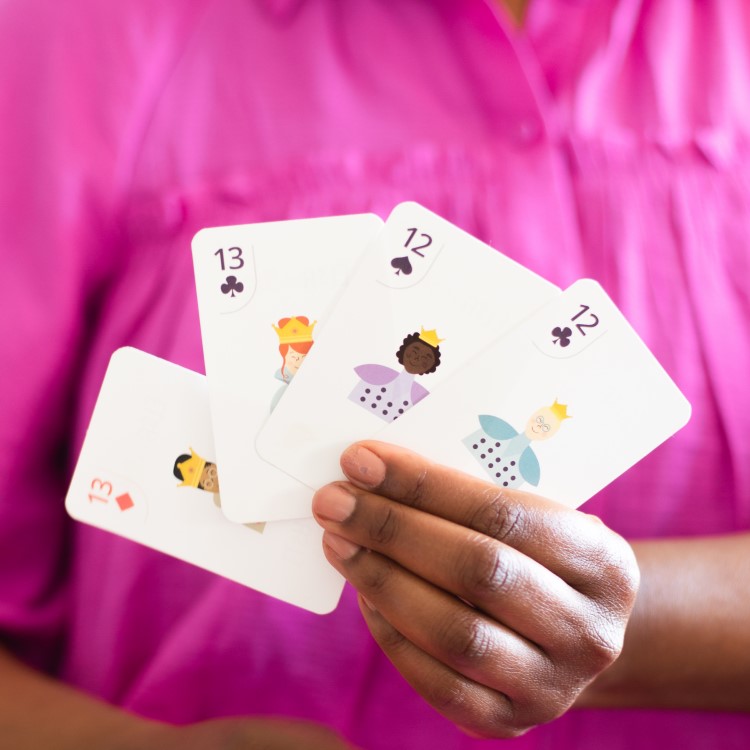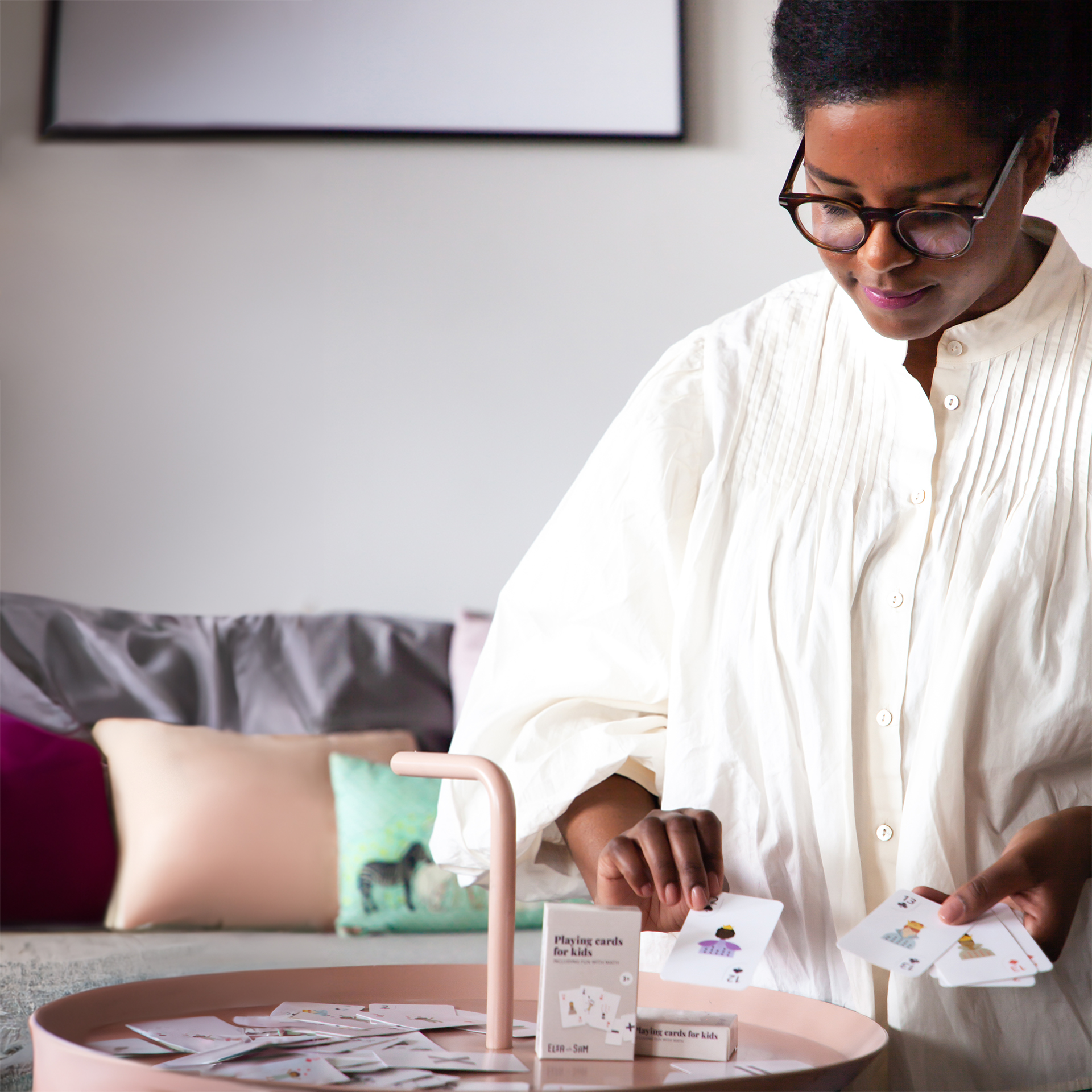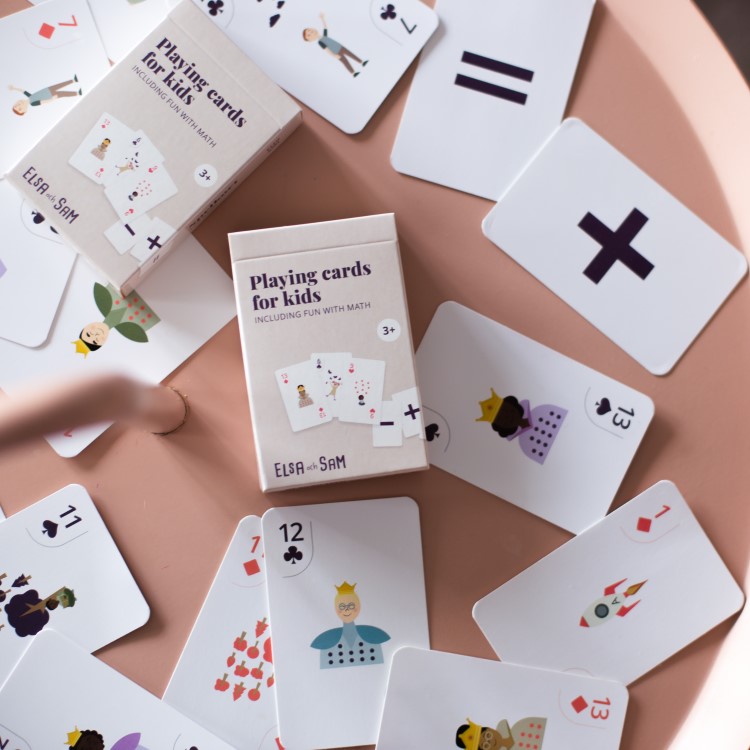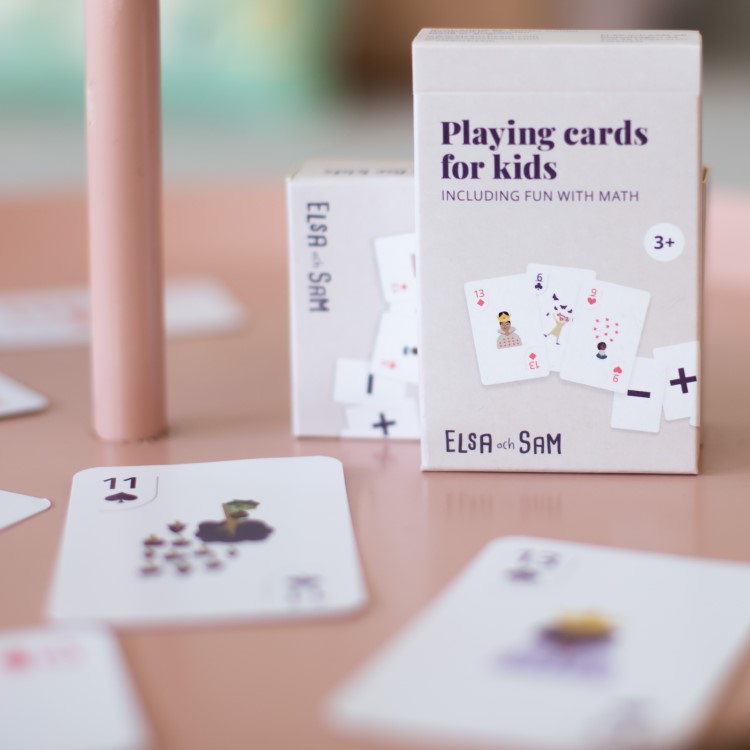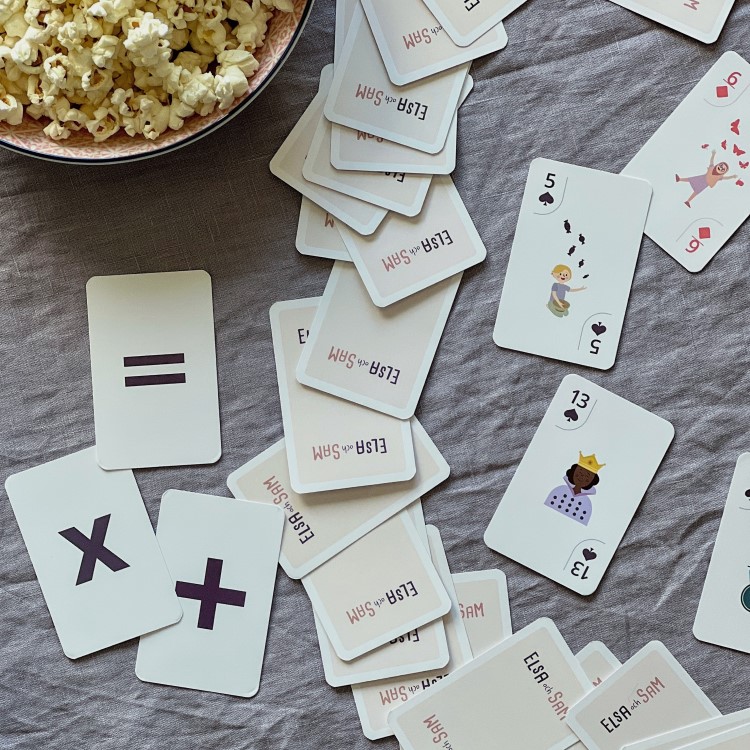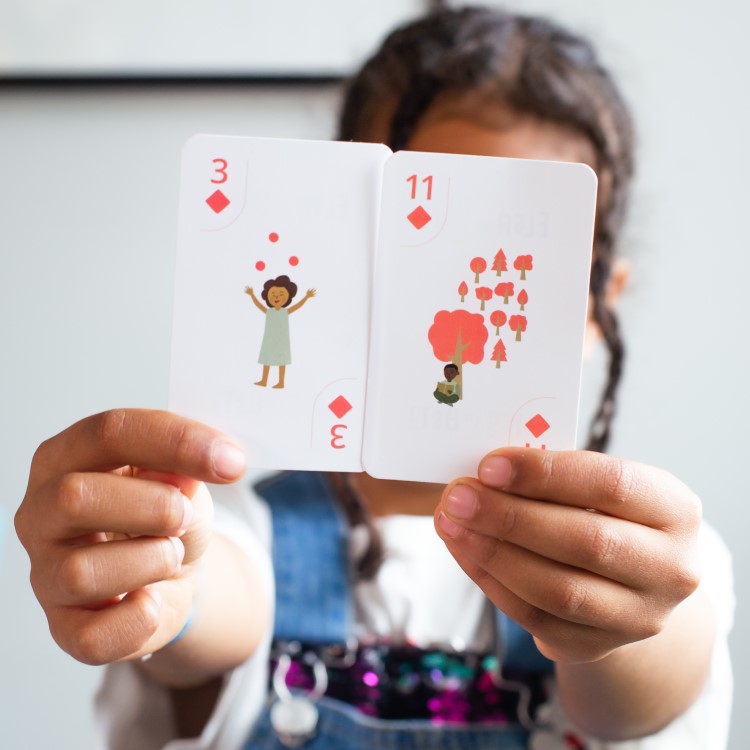Innovator of the month: Johanna Abdo
Innovation: Deck of cards with maths symbols
Johanna creates more inclusive environments for children
Johanna Abdo didn't really have any big plans to start a business, but an idea came from a Christmas present that didn't go according to plan. Johanna was looking for a superhero jumper with a hero of the same skin tone as her child, but was unsuccessful. The lack of brown superhero shirts was telling. She decided to do something about it. Soon after, the idea was born to develop products aimed at children from a norm-critical and inclusive perspective.
- Initially, I thought about which products are widely used within families. I realised that board games are often very traditional and that the most common deck of cards has looked the same for years. So, I created a product that I myself had been missing in the market," says Johanna..
Playing cards from a norm-critical perspective
The deck of playing cards Johanna has developed consists of various inclusive illustrations of children based on aspects of disability, ethnicity and gender roles. From an educational perspective, all playing cards have numbers instead of letters, to facilitate understanding how much each card is worth. In addition, the deck of cards has switched the number order of the king and queen, so that the queen has the number thirteen and the king in turn has the number twelve. This is a way of challenging prevailing gender roles.
- The change in the king and queen has provoked both positive reactions, and some discussion. Adults in particular are questioning the change however children are much more open to it’ says Johanna.
The meaning of diversity
The card game was created not only from an inclusive perspective, but also from an educational one, since an important target group for the activity is schools and pre-schools. The cards are therefore designed to make it easy to practise different maths numbers, one example being the jokers which are replaced by different maths signs such as plus, minus and equals signs. Another educational aspect of Johanna's work is her outreach work, which involves helping other businesses to increase the diversity of the spaces in which children spend time. This includes understanding their own prejudices, mapping environments within the activity and increasing understanding about what norms are reproduced based on who is seen where. In this way, representation has a huge impact on children's everyday lives, which many may not reflect on.- It is important not to underestimate children's ability to pick up on who is considered important. At an early age, children may be told things like - you can't be a princess because you're brown.
Although inclusion and diversity are concepts that have become more frequently discussed lately, Johanna says there is still a lot to be done.
- It's a positive trend that people are more open to discussions about diversity, but in some cases the word is losing its meaning. In some cases, there may be outward inclusiveness in marketing that is not reflected in operations. I think companies need to get better at defining what they mean when they say diversity. A lot of people like to talk about gender equality and what the gender balance is in management teams, but they lose the other perspectives.
The importance of setting concrete targets
Johanna has a valuable tip for companies that want to work with diversity, which is to set goals. Companies can start by mapping their own environments and asking themselves whether they are in line with the company's values. Try to define in concrete terms what challenges exist and what goals need to be achieved.
- One of the goals of our company is to create more inclusive environments for children. My vision is that every classroom and preschool in Sweden will have materials that reflect all different types of people. In the future, I would also like to reach more markets and thus reach more families.
Although it can sometimes be difficult to navigate as a self-employed person and try to find all the answers yourself, Johanna's drive to work with inclusion and issues close to her heart seems to be an important aspect.
- When it's about issues that you're passionate about, you have the energy to keep going.
Johanna's tips for other innovators:
Dare to settle for "good enough". Don't wait for the products to be perfect, but test and see what happens and start producing your products on a smaller scale. Find out if there is any free social support in the form of advice or training that you can take advantage of when you decide to start your own business.
Remember that nobody can do everything by themselves, so get help from those around you.
Innovator of the month: Johanna Abdo
Innovation: Deck of cards with maths symbols
Johanna creates more inclusive environments for children
Johanna Abdo didn't really have any big plans to start a business, but an idea came from a Christmas present that didn't go according to plan. Johanna was looking for a superhero jumper with a hero of the same skin tone as her child, but was unsuccessful. The lack of brown superhero shirts was telling. She decided to do something about it. Soon after, the idea was born to develop products aimed at children from a norm-critical and inclusive perspective.
- Initially, I thought about which products are widely used within families. I realised that board games are often very traditional and that the most common deck of cards has looked the same for years. So, I created a product that I myself had been missing in the market," says Johanna..
Playing cards from a norm-critical perspective
The deck of playing cards Johanna has developed consists of various inclusive illustrations of children based on aspects of disability, ethnicity and gender roles. From an educational perspective, all playing cards have numbers instead of letters, to facilitate understanding how much each card is worth. In addition, the deck of cards has switched the number order of the king and queen, so that the queen has the number thirteen and the king in turn has the number twelve. This is a way of challenging prevailing gender roles.
- The change in the king and queen has provoked both positive reactions, and some discussion. Adults in particular are questioning the change however children are much more open to it’ says Johanna.
The meaning of diversity
The card game was created not only from an inclusive perspective, but also from an educational one, since an important target group for the activity is schools and pre-schools. The cards are therefore designed to make it easy to practise different maths numbers, one example being the jokers which are replaced by different maths signs such as plus, minus and equals signs. Another educational aspect of Johanna's work is her outreach work, which involves helping other businesses to increase the diversity of the spaces in which children spend time. This includes understanding their own prejudices, mapping environments within the activity and increasing understanding about what norms are reproduced based on who is seen where. In this way, representation has a huge impact on children's everyday lives, which many may not reflect on.- It is important not to underestimate children's ability to pick up on who is considered important. At an early age, children may be told things like - you can't be a princess because you're brown.
Although inclusion and diversity are concepts that have become more frequently discussed lately, Johanna says there is still a lot to be done.
- It's a positive trend that people are more open to discussions about diversity, but in some cases the word is losing its meaning. In some cases, there may be outward inclusiveness in marketing that is not reflected in operations. I think companies need to get better at defining what they mean when they say diversity. A lot of people like to talk about gender equality and what the gender balance is in management teams, but they lose the other perspectives.
The importance of setting concrete targets
Johanna has a valuable tip for companies that want to work with diversity, which is to set goals. Companies can start by mapping their own environments and asking themselves whether they are in line with the company's values. Try to define in concrete terms what challenges exist and what goals need to be achieved.- One of the goals of our company is to create more inclusive environments for children. My vision is that every classroom and preschool in Sweden will have materials that reflect all different types of people. In the future, I would also like to reach more markets and thus reach more families.
Although it can sometimes be difficult to navigate as a self-employed person and try to find all the answers yourself, Johanna's drive to work with inclusion and issues close to her heart seems to be an important aspect.
- When it's about issues that you're passionate about, you have the energy to keep going.
Johanna's tips for other innovators:
Dare to settle for "good enough". Don't wait for the products to be perfect, but test and see what happens and start producing your products on a smaller scale. Find out if there is any free social support in the form of advice or training that you can take advantage of when you decide to start your own business.
Remember that nobody can do everything by themselves, so get help from those around you.
